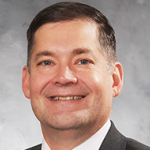The organization that I lead, the Board of Regents of University System of Georgia, runs a private cloud across the state of Georgia. We either own, or have indisputable use of, about 2,800 miles of fiber. We use that fiber by putting our own equipment at the end of it and proactively manage our institutions so that if they need more bandwidth, we can preemptively turn it up.
It’s a huge perk, and it means our local CIOs really don’t have to worry about bandwidth at all. It’s essentially a bottomless bucket, as long as it's used efficiently and in a cost-effective manner. If an institution has a major event — Columbus State University, for example, recently worked with NASA on an astronomical event that occurs every 300 years — we can dramatically increase bandwidth to make sure that event is covered appropriately.
All the University System of Georgia (USG) institutions are dual-homed, so that if one link goes down, another automatically kicks on. Actually the users can’t even tell it’s the same size pipes coming in. We just use one and make sure the other is available. Squirrels in Georgia like their fiber, there are always squirrels chewing on fiber lines somewhere, but — knock on wood — we’ve never had an instance where both lines have gone down at the same time when there are physically separate paths going in.
From commodity services to value-added services
Our private cloud configuration allows our CIOs the luxury of not focusing on bandwidth because it always works. We’ve been able to layer value-added services on top of it — more traditional services like bandwidth as a service, software as a service, backup as a service, and virtual data centers as a service. Our institutions now can focus on students and the value they add to our schools, not on IT as a standalone commodity.
Our local CIOs even take some pleasure in telling telecom company representatives, “If you can beat free, then I’m willing to listen.” That tends to shut down most conversations. There is no fee for those services, it’s just built into working within the USG.
Technology as an educational equalizer
Because of the success of this service, the CIO from the Georgia Department of Education started working with us to develop a proposal to move the 6,000 K-12 schools in Georgia — about 181 school districts, 1.6 million students — onto our private cloud. Gov. Nathan Deal approved this project and included it in his budget for this last year. We’re in the process of implementing that right now to go live in July 2015. In many cases, school districts or schools are going to have a 33-fold increase in bandwidth available to them. This will help to flatten the state. No more haves or have-nots in terms of bandwidth going into the school districts. The school districts will then distribute to the individual schools.
Based on the press behind this proposal, we’ve now got other state agencies, very large state agencies, coming to us and saying, “We want on your private cloud as well,” so we’ve got to scale that in. I think it’s an example of realizing the economies of scale and building a reputation by being able to deliver services that always work. When that happens, the reputation starts to spread and then other agencies start to look at it. Instead of building their own, they realize the cost savings in a partnership to deliver that.
It’s not a hard sell. It’s about delivering results and being open. It’s not like my own or my staff’s pay is going to go up by doing this. It’s just the right thing to do. We want to work in partnership with other state agencies. That's why we’ve always been receptive to trying to generate larger economies of scale for providing those services.
Read, "Where Public and Private Clouds Meet"
Curtis A. Carver Jr., Ph.D. is the Vice Chancellor and Chief Information Officer for the Board of Regents of University System of Georgia (USG). In this capacity, he oversees a statewide educational infrastructure and service organization with more than 190 innovators and more than $75 million annual investment in higher education. He also provides technical oversight of the USG Shared Services Center. Dr. Carver has led the transformation of IT services by partnering with USG business owners, institutions, and other state agencies to jointly solve problems.




